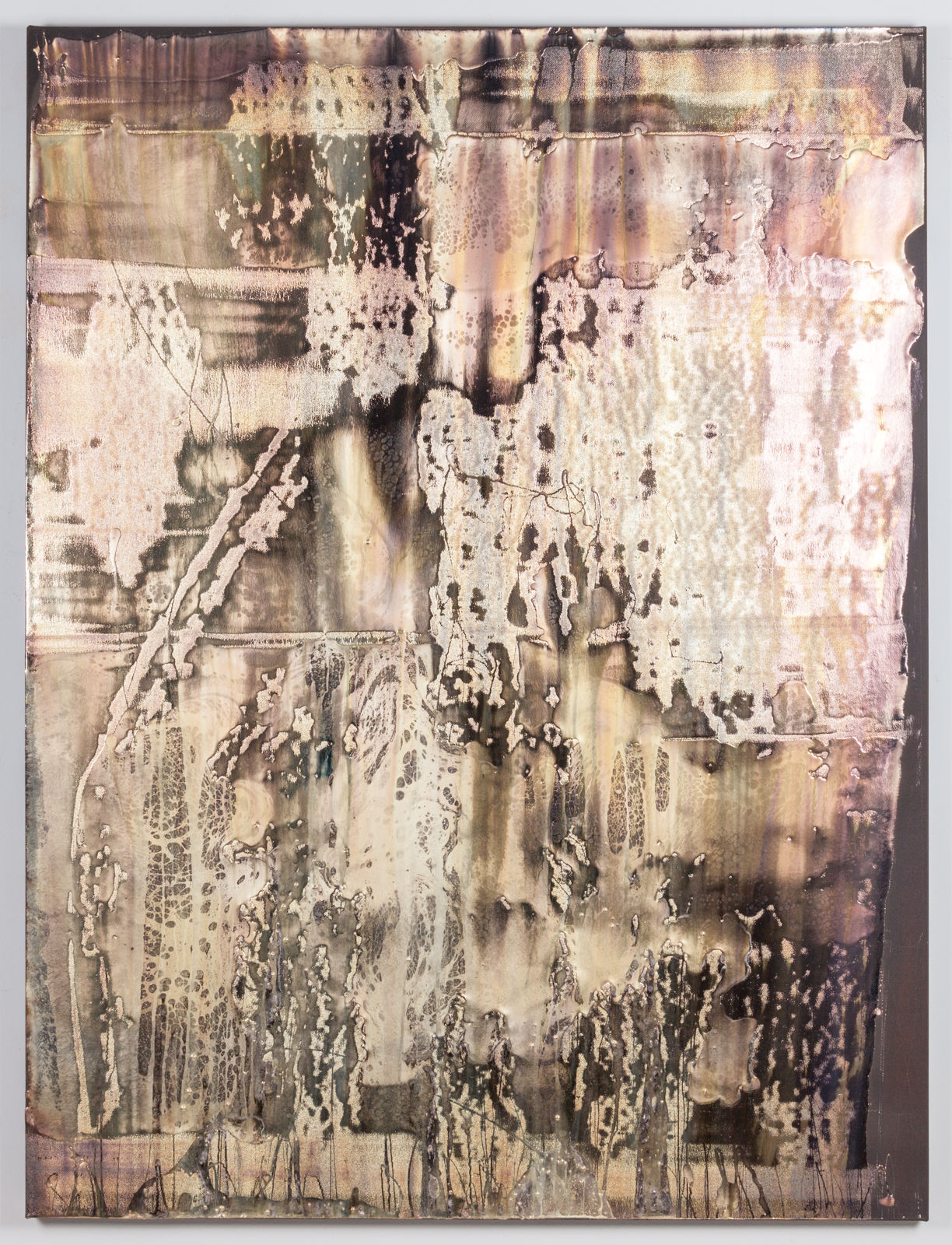Michael Joo Korean-American, b. 1966
Various Low Mass Stars (NY Farm Colony 2), 2018
Silver nitrate and epoxy ink on canvas
62 x 47 x 2 in
157.5 x 119.4 x 5.1 cm
Unframed
157.5 x 119.4 x 5.1 cm
Unframed
6681
Further images
This painting belongs to Michael Joo's Various Low Mass Stars series of silver-nitrate paintings, which was derived from squatted architectural ruins and created in situ by exposure to the elements...
This painting belongs to Michael Joo's Various Low Mass Stars series of silver-nitrate paintings, which was derived from squatted architectural ruins and created in situ by exposure to the elements over the course of several days. The series examines how site is a place for encounters as well as explorations, and how time and absence affect representation and reality.
“For me, these works deal with the origins of painting not merely as something plastic, but as fragile, frozen moments emblematic of encounters at the intersection of time, material, and process,” says Joo. “It’s always the marriage of meaning and material that interests me—how we get there, and what possible other avenues of meaning we might find within our expectations of and responses to objects and each other.”
In an interview for Studio International, Joo talked about his use of this unusual medium:
"I guess I first encountered it in the laboratory as a test for aldehydes, but, technical stuff aside, it reappeared ironically for me lightyears later, or so it seemed, when I was in Venice (15 or 20 years ago, now). I had no intention of working in glass, but I was brought into some great craftpersons’ studios—I’m a big fan, of course, of all the pyrotechnics involved within the process of work [methods], and there are not many that can rival glass-making. Some of the glass mirroring I first came across was in an out-of-the-way glass studio in Murano. Watching the process [of treating glass with silver nitrate to create the mirroring] was incredible. It was created with no safety equipment and very gracefully done, quite cavalier—not only managing to not get silver nitrate poisoning, but done with grace and familiarity. I was drawn to the combination of the performative aspect of mirroring the glass and the chemical science; it was perhaps alchemical. Watching the traditional transformation process recalls the past, but also looks to the future of mirror in technology in the performative ballet that they had perfected."
At the heart of this work is the question: Why do we perceive as we perceive? Joo’s non-linear, almost cyclical approach to his practice, together with his combination of scientific language and research, results in work that is a documentation of process. Whether chemically treated, silver-coated or photo-based, Joo’s artwork combines a range of techniques associated with sculpture, painting, photography, and printmaking. He continues to blur the boundaries between art and science through his investigation into ontology, epistemology, and entropy, creating a cross-disciplinary and multi-dimensional dialogue to engage, question, meditate, and explore. By juxtaposing humanity’s various pools of knowledge and culture, Joo addresses the fluid nature of identity itself. It seems as if the artist’s intention is to achieve the unachievable: to make us see an object in real life that is barely conceivable as thought alone.
“For me, these works deal with the origins of painting not merely as something plastic, but as fragile, frozen moments emblematic of encounters at the intersection of time, material, and process,” says Joo. “It’s always the marriage of meaning and material that interests me—how we get there, and what possible other avenues of meaning we might find within our expectations of and responses to objects and each other.”
In an interview for Studio International, Joo talked about his use of this unusual medium:
"I guess I first encountered it in the laboratory as a test for aldehydes, but, technical stuff aside, it reappeared ironically for me lightyears later, or so it seemed, when I was in Venice (15 or 20 years ago, now). I had no intention of working in glass, but I was brought into some great craftpersons’ studios—I’m a big fan, of course, of all the pyrotechnics involved within the process of work [methods], and there are not many that can rival glass-making. Some of the glass mirroring I first came across was in an out-of-the-way glass studio in Murano. Watching the process [of treating glass with silver nitrate to create the mirroring] was incredible. It was created with no safety equipment and very gracefully done, quite cavalier—not only managing to not get silver nitrate poisoning, but done with grace and familiarity. I was drawn to the combination of the performative aspect of mirroring the glass and the chemical science; it was perhaps alchemical. Watching the traditional transformation process recalls the past, but also looks to the future of mirror in technology in the performative ballet that they had perfected."
At the heart of this work is the question: Why do we perceive as we perceive? Joo’s non-linear, almost cyclical approach to his practice, together with his combination of scientific language and research, results in work that is a documentation of process. Whether chemically treated, silver-coated or photo-based, Joo’s artwork combines a range of techniques associated with sculpture, painting, photography, and printmaking. He continues to blur the boundaries between art and science through his investigation into ontology, epistemology, and entropy, creating a cross-disciplinary and multi-dimensional dialogue to engage, question, meditate, and explore. By juxtaposing humanity’s various pools of knowledge and culture, Joo addresses the fluid nature of identity itself. It seems as if the artist’s intention is to achieve the unachievable: to make us see an object in real life that is barely conceivable as thought alone.
Provenance
Artist Studio, NYCKavi Gupta Gallery
Exhibitions
Project Michael Joo, Kavi Gupta Gallery, 2019Armory Show, NYC, 2019
Art Basel Miami Beach, Miami, 2019
Sensory Meridian, Kavi Gupta Gallery, 2021










